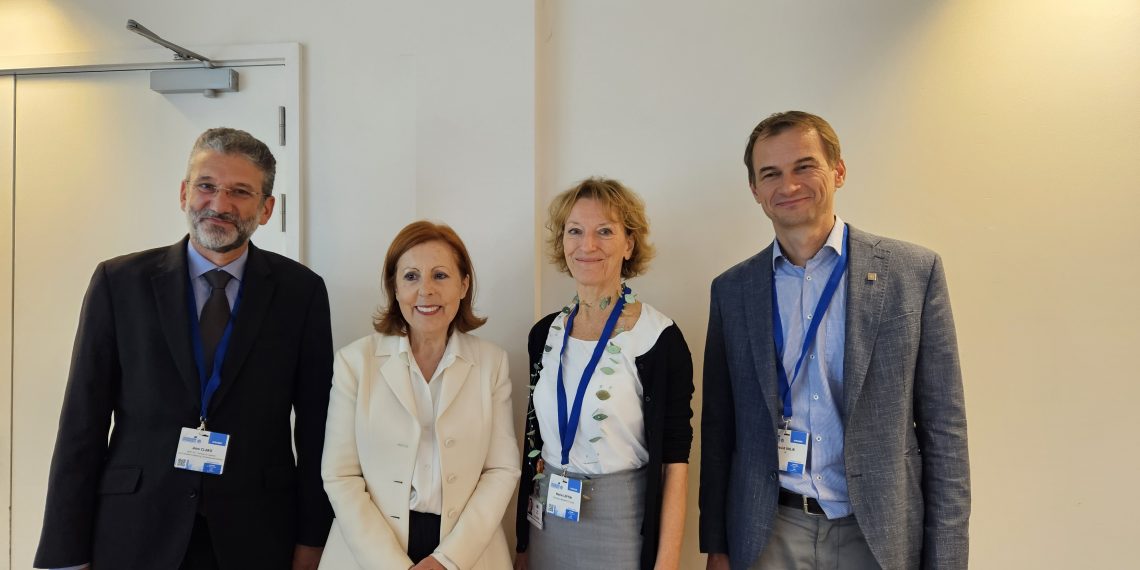João Claro, CEO of INESC TEC, was a speaker at one of the workshops of the European Week of Regions and Cities (Brussels), the largest annual event dedicated to policy cohesion, organised by DG Regio (the European Commission’s Directorate-General for Regional and Urban Policies) and the European Committee of the Regions.
The CEO of INESC TEC was part of the panel discussion of the workshop “Thriving regions through science: how innovative research centres can retain talent and drive growth”, organised by the European Research Council (ERC) within the scope of the week-long activities dedicated to cohesion. The panel discussion, moderated by the president of the ERC, Maria Leptin, also featured Maria da Graça Carvalho, a member of the European Parliament, and David Uhlíř, director of strategy at the innovation centre of Southern Moravia (a region located in Czechia).
The purpose of the discussion focused on how science can contribute to regional growth and social cohesion. The debate highlighted two research centres: INESC TEC, in Portugal, and CEITEC (Central European Institute of Technology), in Czechia, two R&D institutions that have already received ERC funding via research grants. Considering INESC TEC, the recipients were Alexandra Silva (2015) and Bruno Loff (2022), when the two were researchers at the institution; both received a grant worth €1.5M to advance their R&D activities. CEITEC currently has five researchers with ERC grants.
“One of the starting points of the conversation was to explain how R&D centres in Northern Portugal and Southern Moravia tap into multiple sources of EU funding: from structural funds to Horizon Europe and ERC grants. I presented the work leading to the establishment of the iLoF spin-off: the initial scientific activities were carried out thanks to national and structural funds, while the commercialisation phase relied on the European programme EIT Health. This is an example of the ability to bridge a gap with European initiatives, promoting economic growth and development, and talent retention and attraction at a regional level”, explained João Claro.
One of the key points of the discussion was precisely how R&D centres can retain talent in European regions, thus benefiting society, and how building bridges – through the different funding programmes made available by the European Union (EU) – can benefit regional growth.
The CEO of INESC TEC also provided other examples of how this approach can sustain (in the long run, and in many ways) a solid R&D work with great results – highlighting the smart grids and the integration of renewable energy sources, with INESC TEC as a reference at European level. João Claro highlighted the complementarities between different axes of work: the creation of national R&D infrastructures; the significant participation in European projects, often as a leader – for example, the InterConnect project, the largest ever initiative led by a Portuguese institution, financed at €38M by the H2020 funding programme; and advanced consulting with an international scope, focusing on countries like U.S.A. or Brazil.
Another topic was how the EU can help lower-performing countries catch up under the Horizon Europe programme. Regarding this question, João Claro brought up some important aspects: “improving support for more strategic, broader and long-term initiatives, favouring the integration of interdisciplinary research, commercialisation, training, infrastructure development and advances in public policies”.
Portugal and Czechia were the two examples chosen, due to the similarities regarding their position in the European Union, in terms of research and development. The R&D intensity index in terms of gross domestic product is very similar (1.7% for Portugal and 1.8% for Czechia), both below the European average of 2.3%. The two countries, considered “moderate innovators” with performances above the European average, welcome several researchers also above the average, but with patent applications below the European norm. Regarding ERC funding, between 2007 and 2022, Portugal raised a total of €253M euros via 139 research grants, while Czechia raised €109M with 63 grants.
The two institutes that were part of the R&D panel also have similar dimensions. Both welcome close to 750 researchers and more than 1000 employees, with an active and vital participation in European funding, through the various EC’s programmes.
Every year, the European Week of Regions and Cities welcomes different profiles, ranging from politicians, decision-makers, experts, businesses, civil society organisations, universities, EU institutions and even the media, to discuss common challenges for European regions and cities.
The researcher mentioned in this news piece is associated with INESC TEC and UP-FEUP




 News, current topics, curiosities and so much more about INESC TEC and its community!
News, current topics, curiosities and so much more about INESC TEC and its community!